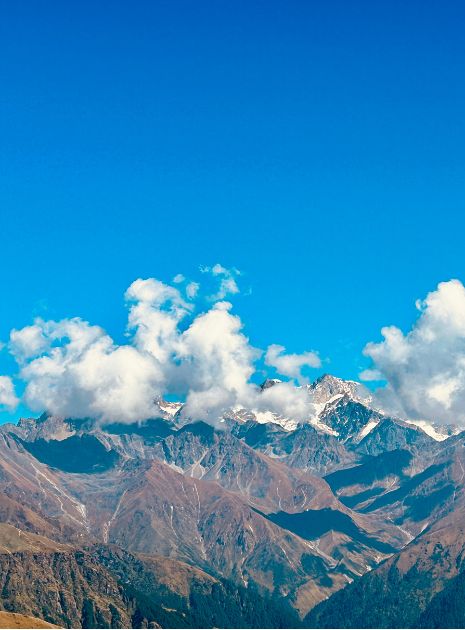If you’re heading from Almora toward Bhikiyasain, at some point the road will narrow, pine trees leaning over on either side, terraces slipping down the hills, and suddenly you’ll be in Malar (मलर). The village doesn’t announce itself. It’s quiet, slow, and alive in its own way. You feel it before you see it in the smell of wet earth after rain, in the soft gurgle of a nearby stream, in the way a rooster crows somewhere up the hill.
Morning in Malar is gentle. Smoke curls lazily from the small कुमाऊँनी घर (Kumaoni homes), women balance water pots on their heads, walking along stone paths that zigzag through the village. Children run barefoot to the school, laughing, sometimes stopping to chase a stray goat or pick a flower. Men head toward the खेत (fields), checking terraces, carrying simple tools.
Even the animals have their routines. Goats wander along the paths, cows graze slowly, and dogs trot behind their owners. Everything moves at a pace dictated by the hills themselves, and somehow, that feels just right.
Malar is small, maybe a few dozen households, but life here is rich in rhythm and connection. Everyone knows everyone. Neighbors chat across fences, borrow a bit of sugar, or drop by with freshly churned मठ्ठा (buttermilk). Children play in the lanes, teasing each other, shouting, laughing, and running in and out of homes. Elders sit outside their houses, sharing stories about old winters, landslide rains, or the crops from years past.
Women do a little bit of everything: cooking, cleaning, tending to the बकरी और गाय (goats and cows), watering gardens. Men work in the fields, plow terraces, plant crops, and repair roofs. Children often help, learning the work and the songs that come with it short folk songs their grandparents taught them, drifting across the terraces as they move.
Terraces in Malar are everything. Crops like मंडुआ (mandua/finger millet) and wheat spill down the hillsides. Farming isn’t a job here; it’s a way of life. The land decides the rhythm sun, rain, seasons, and people follow.
Harvest time is a mix of hard work and laughter. Villagers sing while planting or cutting crops. Sometimes a goat wanders into the fields, children chase it, and everyone laughs. Even carrying water, collecting firewood, or repairing a roof is part of the rhythm, small, simple, meaningful tasks that tie life together.
There’s a small विद्यालय (school) in the village. Kids sit on benches, some barefoot, learning letters and numbers. Older children walk to nearby towns for further schooling. Education is slower than in cities, but it’s valued. Parents watch proudly as their children write for the first time or read a book aloud.
It’s a delicate balance learning about the wider world while staying rooted in the village, in the soil, the terraces, and the traditions that have lasted generations.
Festivals are when the village truly shines. Harela brings songs and planting of saplings. Makar Sankranti is all about kite flying, sweets made of jaggery and sesame, and laughter that echoes over the hills. Diwali lights up Malar with small clay lamps on छप्पर (rooftops).
Even outside festivals, community matters. Neighbors help each other repair homes, carry water, and gather crops. Children are watched over collectively. Stories of old rains, landslides, and monsoon floods are shared at dusk, often around small fires or outside a home, as the wind whistles gently through the hills.
The nearest big town is Almora, about 70–75 km away. From there, you take a jeep or a small bus toward Bhikiyasain, then follow the narrow hill roads to the village. The road can be bumpy, muddy after rain, and goats or cows may block the path part of the charm.
Stop at a small ढाबा (roadside eatery) if you want tea or snacks. Stretch your legs, watch clouds drifting over terraces, smell the pine in the air, and listen, even before reaching the village, you start to feel its rhythm.
Malar isn’t about tourist sights or fancy attractions. It’s about being present. Feeling the hills under your feet, the smoke from kitchens, the laughter of children, the slow rhythm of life. It teaches patience. It shows that joy can be found in simplicity, in terraces full of green crops, warm food, and neighbors who care.
Leave Malar, and it doesn’t leave you. The hills, the laughter, the smell of wet soil, they linger. It’s a village that teaches you to slow down, notice small things, and appreciate life’s rhythm.

Uttarakhand is not simply another country. People here name it Devbhoomi (देवभूमि), the Land of the Gods. And it feels that way. Rivers begin right here. Old temples sit on mountain tops. Morning dayl...